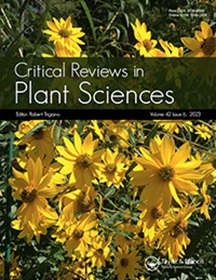Mechanisms of Cadmium Accumulation in Plants
IF 6
2区 生物学
Q1 PLANT SCIENCES
引用次数: 100
Abstract
Abstract Cadmium is a non-essential trace metal, which is highly toxic to nearly all living organisms. Soil pollution causes Cd contamination of crops, thereby rendering plant products responsible for the chronic low level Cd over-exposure of numerous populations in the world. For this reason, Cd accumulation in plants has been studied for about five decades now. The research first focused on the relationships between plant and soil Cd levels, on the factors of the metal availability in soil, as well as the root uptake processes. Cd distribution in plant organs was also investigated, first using a macroscopic and eco-physiological approach, and then with the help of molecular biology tools, at both tissue and cell scales. Cadmium has no biological function and hijacks the transport pathways of micronutrients such as Fe, Mn, or Zn, in order to enter the plant through the roots and be distributed to all its organs. The study of the genes that control the influx and efflux of the Cd2+ ion in the cytosol, vacuoles, and vascular tissues has significantly contributed to the understanding of the metal root uptake and of its transfer to the aerial parts. However, the mechanisms responsible for its distribution to the different above-ground tissues and specially to fruits and seeds have yet to be clarified. This review summarizes current knowledge in order to present a detailed overview of Cd transport and storage, from the rhizosphere to the different organs and tissues of the plant.镉在植物体内积累的机制
镉是一种非必需的微量金属,对几乎所有生物都有剧毒。土壤污染导致作物的Cd污染,从而使植物产品对世界上许多人群的慢性低水平Cd过度暴露负有责任。因此,人们对植物体内镉的积累进行了近50年的研究。本研究首先关注植物与土壤镉水平的关系、土壤中金属有效性的影响因素以及根系吸收过程。Cd在植物器官中的分布也进行了研究,首先使用宏观和生态生理方法,然后借助分子生物学工具,在组织和细胞尺度上进行了研究。镉没有生物学功能,它劫持铁、锰、锌等微量元素的运输途径,通过根系进入植物,并分布到植物的各个器官。对控制Cd2+离子在细胞质、液泡和维管组织内流入和流出的基因的研究,极大地促进了对金属根吸收及其向空中部分转移的理解。然而,其分布到不同地上组织,特别是果实和种子的机制尚不清楚。本文综述了镉在植物根际到不同器官和组织的运输和储存过程。
本文章由计算机程序翻译,如有差异,请以英文原文为准。
求助全文
约1分钟内获得全文
求助全文
来源期刊
CiteScore
12.90
自引率
1.40%
发文量
15
审稿时长
>12 weeks
期刊介绍:
Critical Reviews in Plant Sciences focuses on presenting in-depth and up-to-date reviews of timely and/or cutting-edge subjects in the broad discipline of plant science, ranging from molecular biology/biochemistry through the areas of cell biology, plant pathology and physiology, genetics, classical botany, and ecology, to practical agricultural applications. Articles in the journal provide an up-to-date literature base for researchers and students, pointing the way towards future research needs. The journal is also a significant source of credible, objective information to aid decision makers at all levels.

 求助内容:
求助内容: 应助结果提醒方式:
应助结果提醒方式:


